Full Service
Specialty Ceramic Tile Store
 World-class hand painted Art on tile is closer to you than ever!
World-class hand painted Art on tile is closer to you than ever!
|
|
Contact
Phone: 404-702-1681
-
About/Guarantee/Customer Service -
US Shipping
-
Non US Shipping
-
Payment -
Installation |
|
|
Location
Showroom:
230 Spring St. - Blg. 2 WW 9-17-A - Atlanta, GA 30303
Mailing
address: 8343 Roswell Rd, P.O. Box: 107 - Atlanta, GA 30318
Studio: Nabeul, Tunisia, Mediterranean
Customer
service email: sales@mtznetwork.com
Phone
number: 404-702-1681
Get to know us! Online since 2005!
Customized
Ceramic Tiles is a specialty tile store that offers hand designed tiling projects. We represent an Art studio that is 7
Artists strong designing on tiles for generations, and offering a
portfolio of 500+ patterns hand designed on tile. All our tiles are
individually hand painted and fired twice, so the colors remain
permanent, UV/frost proof, scratch resistant, and suitable for indoor use or
exterior decor.
How to order?
Ordering tiles takes
place on line. Shipping is free to anywhere indeed.
Ordering an existing
design takes place online.
Ordering a resized
existing design takes place online too. Our price estimator
provides buyer with instant quote and easy check out process.
Shipping questions
Tiles ship from Tunisia,
directly from the Artist, on a 10-14 days delivery basis.
Shipping within the US.
Canada, AK, HI, PR, US Territories, tales places with USPS. We
also deliver to PO Boxes and APO addresses.
Non US orders ship with
the country's government run postal service, and takes some 10-14
days for delivery.
We ship to anywhere
around the world.
Packages are delivered
to the client's door step, signature required at reception, and
custom duty free.
References
View portfolio
and take a look at some of the magnificent decorating projects we contributed
to.
Custom
projects
If
you need help to have your own decorating idea hand designed on tiles, please do
not hesitate to
contact us
requesting a quote.
Please be specific about the dimensions, where the project is being shipped to,
and with what you want hand designed.
Please attach the necessary images and/or sketches to explain your project.
Returns
We so
want our tiles part of your decorating project. So, we make sure we do things
right, the first time.
Buyer
remorse returns: Buyer pays shipping return of the package to our Atlanta, GA
warehouse.
Return requests due to other reasons, are treated on a case by case situation.
We tend to be flexible and put our resources to work for you, so your tiling
project looks right.
Interior Designers - B2B
Designers, you can tile
anything. Let us contribute to your very next decorating project
that involves accent tiles.
Guarantee
We guarantee that our
tiles will travel well protected and arrive safe. In the unlikely
event of damage to the tiles during shipping and/or installation,
we provide free replacements.
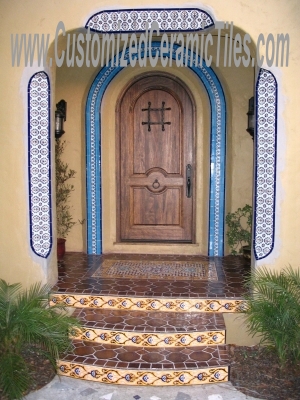 Accent Entrance
Accent Entrance
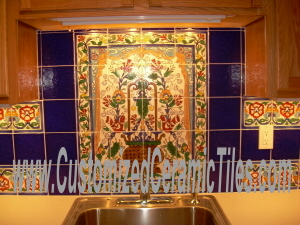 Accent Kitchen Backsplash
Accent Kitchen Backsplash
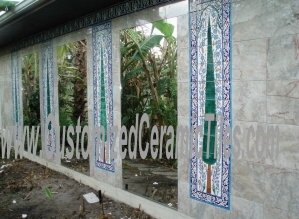 Garden Tiles
Garden Tiles
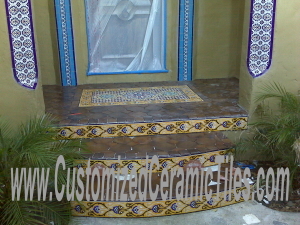 Entrance Tiles
Entrance Tiles
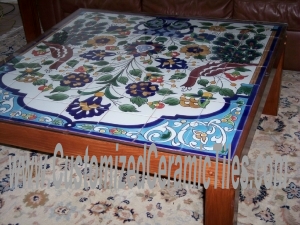 Accent Tiled Table
Accent Tiled Table
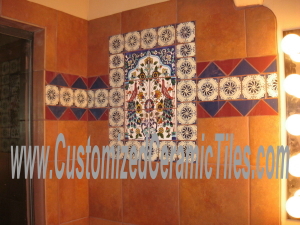 Peacock Wall
Mural
Peacock Wall
Mural
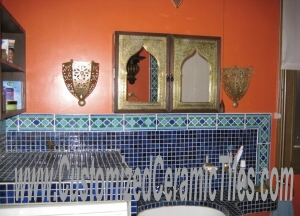 Bathroom Border
Tiles
Bathroom Border
Tiles
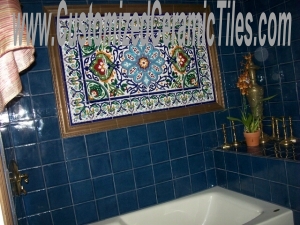 Bathroom Backsplash
Bathroom Backsplash
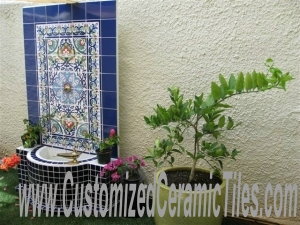 Fountain Tiles
Fountain Tiles
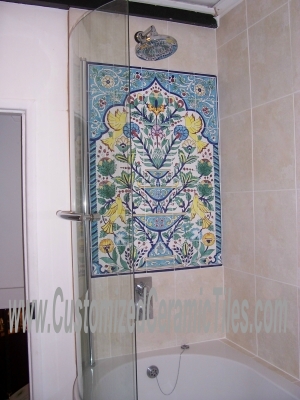 Bathroom Backsplash
Bathroom Backsplash
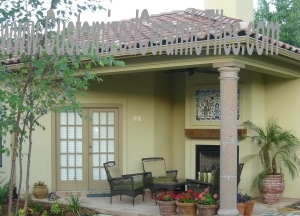 Outdoor Mosaic Mural
Outdoor Mosaic Mural
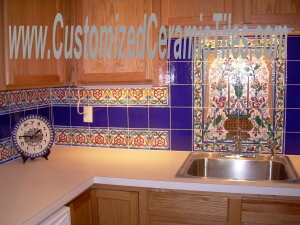 Kitchen Wall
Decor
Kitchen Wall
Decor
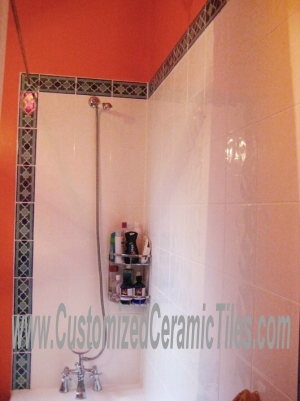 Bathroom Border
Tiles
Bathroom Border
Tiles
|
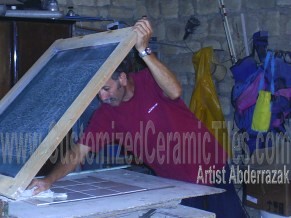 About Tunisia
Tunisia may
be the smallest country in North Africa, but its strategic position has ensured
it an eventful history. The Phoenicians, Romans, Vandals, Byzantines, Arabs,
Ottomans and French have all picked at the region at one point. The earliest
humans to set foot here were probably a group of Homo erectus who stumbled onto
the place a few hundred thousand years ago as they joined north-west across the
Sahara from East Africa. It's believed that in those days what is now arid
desert was covered in forest, scrub and savanna grasses, much like the plains of
Kenya and Tanzania today. The earliest hard evidence of human inhabitation was
unearthed near the southern oasis town of Kebili and dates back about 200,000
years.
About Tunisia
Tunisia may
be the smallest country in North Africa, but its strategic position has ensured
it an eventful history. The Phoenicians, Romans, Vandals, Byzantines, Arabs,
Ottomans and French have all picked at the region at one point. The earliest
humans to set foot here were probably a group of Homo erectus who stumbled onto
the place a few hundred thousand years ago as they joined north-west across the
Sahara from East Africa. It's believed that in those days what is now arid
desert was covered in forest, scrub and savanna grasses, much like the plains of
Kenya and Tanzania today. The earliest hard evidence of human inhabitation was
unearthed near the southern oasis town of Kebili and dates back about 200,000
years.
The Phoenicians first set up shop in Tunisia at Utica in 1100 BC, using it as a
staging post along the route from their home port of Tyre (in modern-day
Lebanon) to Spain. They went on to establish a chain of ports along the North
African coast, the most important of which included Hadrumètum (Sousse) and
Hippo Diarrhytus (Bizerte). But the port that looms largest in history books is
Carthage, arch enemy of Rome. It became the leader of the western Phoenician
world in the 7th century and the main power in the Western Mediterranean in the
early 5th century. The city's regional dominance lasted until the Punic Wars
between Rome and Carthage, which began in 263 BC and ended in 146 BC with
Carthage utterly razed and its people sold into slavery.
The Tunisian territory became Roman property after the war. The emperor Augustus
refunded Carthage as a Roman city in 44 BC, naming it the capital of Africa
Proconsularis, Rome's African holdings. Agriculture became all-important, and by
the 1st century AD, the wheat-growing plains of Tunisia were supplying over 60%
of the empire's requirements. The Romans went on to found cities and colonies
across Tunisia's plains and coastline; today, they're Tunisia's principal
tourist attractions.
By the beginning of the 5th century, with Rome's power in terminal decline, the
Vandals decided the area was ripe for plucking. Within 10 years, they'd taken
Carthage as their capital and began to, well, vandalize. Their exploitative
policies alienated them from the native Berber population, who in turn formed
small kingdoms and began raiding the Vandal settlements. The Byzantines of
Constantinople, who pulled the territory from the Vandals in 533 and kept it for
the next 150 years, fared no better.
Islam burst onto the scene in the 7th century, when the Arab armies swept out of
Arabia, quickly conquering Egypt. The Arabs had taken all of North Africa by the
start of the 8th century, and, with Kairouan as its capital, the region became a
province of the fast-expanding Islamic empire controlled by the caliphs of
Damascus.
The Berbers adopted Islamic religious teachings readily enough, but they riled
under their harsh treatment by the Arabs. Their uprisings continued until 909,
when a group of Berber Shiites, the Fatimids, glommed together disaffected
Berber tribes and took North Africa back from the Arabs.
Their capital was raised on the coast at Mahdia, but the unity was to be
short-lived. When some of the tribes returned to the Sunni mainstream, the
tribes began to fight one another and North Africa was slowly reduced to ruins.
Conflicts arose again when North Africa was caught in the middle of the rivalry
between Spain and the Ottoman Empire in the middle of the 16th century. Tunis
changed hands half a dozen times in some 50 years, before the Turks took it in
1574 and it became an Ottoman territory. Ottoman power lasted through to the
19th century, when France became the new power in the Western Mediterranean and
Tunis came under increasing pressure to conform to their European ways.
In 1881, the French sent 30,000 troops into Tunisia under the pretext of
countering border raids into French-occupied Algeria. They quickly occupied
Tunis and forced the ruling Bey to sign over his power to the French. Soon
after, they had discretely nabbed the best of Tunisian land. The fall of France
in WWII opened the door for Tunisian nationalists to step up their independence
campaign, and one man in particular, Habib Bourguiba, set about bringing
Tunisia's position into the international spotlight.
By the early 1950s, the French were ready to make concessions.
Tunisia was formally granted independence on 20 March 1956, with Bourguiba as
prime minister. The following year, the country was declared a republic and
Bourguiba became its first president, instituting sweeping political and social
changes. Regarding Islam as a force that was holding the country back, Bourguiba
set about reducing its role in society by removing religious leaders from their
traditional areas of influence, such as education and the law. The shari'a (Qur'anic
law) courts were also abolished, and lands that had financed mosques and
religious institutions were confiscated.
About Neapolis
Nabeul (Neapolis, or New City) ancient battlefield
for the Greek founded in the 5th Century AC and twin sister to an other Neapolis
(Naples, Italy), is the Capital of the Ceramic in Tunisia.
Thanks to its strategic location in the Central Coast of the Mediterranean and
the diversity of its agricultural produces, Nabeul has known a massive flow of
immigrants from all over the Mediterranean who brought with them a know-how in
agriculture development as well as in manufacturing industries.
Known since the Greek and Roman eras for its pottery made out of fine terra
cotta, Nabeul has developed a more diversified quality of pottery with the
arrival of Islam to the Region, by shifting it styles to the well-known Persian
Decor (current Iran)
Ceramics has been since considered for Mosques and Palaces Decor.
Nabeul has know three major stages in its optimization of techniques and pottery
production.
In a first stage, Nabeul's pottery shown strong development signs following the
influence of the Renaissance Movement, born in the neighboring Italy.
Later on, Muslims chased from Andalusia, Spain (15th Century DC) after the
conquest of Spain by the Catholics, found refuge in the Region of Nabeul and
neighboring areas.
A last major influence on the fired pottery production took place when the
Country became under French Protectorate (19-20th Century DC)
A dozen of Mom & Pop companies, in major part of Andalusia, Spain origins,
supply about 80% of the Tunisian overall Ceramics production, consisting of :
building and hardware (bathroom and kitchen decor) , decorative (ceramic murals
and tiles) , and kitchenware products (dinnerware and tea sets.)
The increasing number of tourists visiting the region has contributed to the
growth of pottery production, soliciting artisans to come out with designs to
meet the "European Tastes."
Today, local authorities finance networks of schools to teach the art of pottery
in order to boost supply, and support meeting the international demand for Mom
and Pop factories.
Nabeul's ceramics are mainly exported to Italy, Malta, France, Greece, Spain,
UK., Germany, Belgium, Argentina, Australia, Canada ... and in recent years to
the United States.
Wall murals and backsplashes are a "must have" in every Tunisian house.
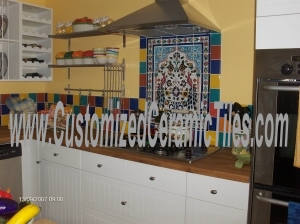 Kitchen Backsplash
Kitchen Backsplash
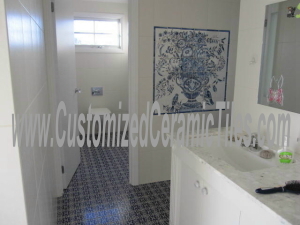 Bathroom Wall Mosaic and Floor Tiles
Bathroom Wall Mosaic and Floor Tiles
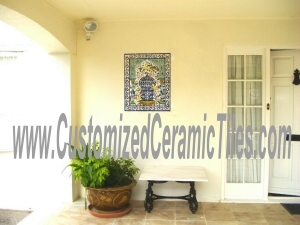 Patio Tiles
Patio Tiles
 "I
LOVE YOU!" 400 tiles set, sold to a recreational center in
Brussels, Belgium
"I
LOVE YOU!" 400 tiles set, sold to a recreational center in
Brussels, Belgium
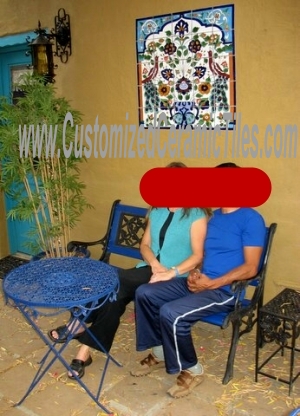 Outdoor Tiles
Outdoor Tiles
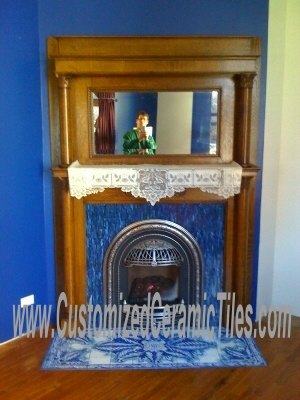 Accent Flooring Tiles
Accent Flooring Tiles
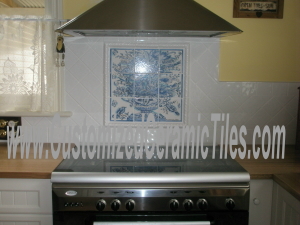 Kitchen
Backsplash
Kitchen
Backsplash
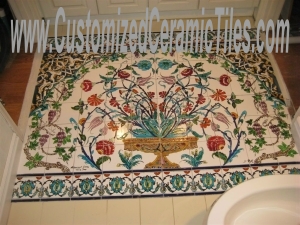 Bathroom Flooring
Mosaic
Bathroom Flooring
Mosaic
|
|
Interior designers -
Installation
-
Payment
-
Contact Us
At the other end of this web store, there is a seven Artists
strong Art Studio, in Nabeul,
Tunisia, for all your tiling
projects!
All our tiles are individually hand painted and fired, so each
tile is really unique. We offer motifs in a variety of designs:
Mediterranean, Italian, French, Spanish, Tunisian, Arabesque,
Antique Looking, Turkish, Persian, Southwestern, etc.
The web store offers
100's of motifs hand designed on tiles, for kitchen backsplash
projects, bathroom tiling, accent flooring,
wall coverings and swimming pools. We can also hand design your
idea on tiles.
Check out our
portfolio
and view the most exotic
wall mural
designs.
Full
Service Specialty Ceramic Tile Store
|
|
2005-2014 Copyrights © All Rights Reserved - CustomizedCeramicTiles.com, by MTZ Network Company |
|